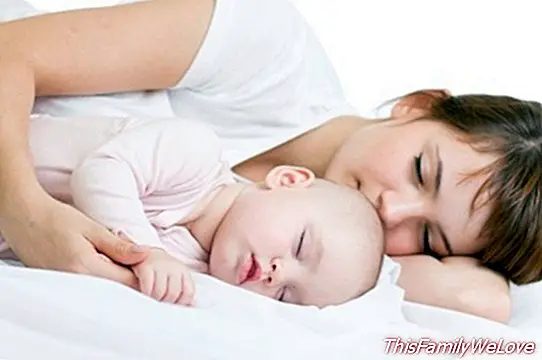Advantages and disadvantages of co-sleeping

It is in the minds of most people that sleeping with a baby is dangerous; We've all heard of one who died while in his parents' bed. What if I crush him? What if it suffocates? Much controversy of the co-sleeping is given by its possible association with Sudden Infant Death (MSL).
70% of Euro-American babies spend at some point in their parents' bed in the first 3 months of life. That is, even if a mother has decided that she is not going to do it, the reality is that it is probable that some night, out of sheer fatigue, she will do it. And in that case you must do it safely.
Regarding the issue of a mother crushing her baby, we know from McKenna's studies that mothers who breastfeed adopt a certain position around their babies, forming a protective nest that prevents the baby from moving away from them. Also, if the mother is deeply asleep in this position her body will relax backwards and never on the baby. In this position the baby is mouth-up when it finishes sucking.
Sleeping with the baby DOES NOT increase the risk of sudden death if ...
- Receive breastfeeding.
- Sleep with your mother sober and non-smoker.
- Sleeping on a safe surface (a co-sleeping crib or a firm mattress, without comforters or pillows that can fall on the baby or spaces where it can get trapped).
- The baby is mouth-up and without excess of clothes.
Sleeping with the baby DOES increase the risk of sudden death if ...
- The mother has smoked during pregnancy and / or continue smoking (even if not in the presence of the baby).
- The baby is fed formula with a bottle.
- The mother has taken drugs or alcohol at the time of sleeping with the baby.
- The mother sleeps with the baby on a sofa or another unsafe surface (a very soft mattress, or a bed in which the baby may be trapped between the bed and the wall, excessive pillows or comforters, etc.).
- The baby is lying face downor is excessively warm.
In view of the data we have at the present time, if any of these points is given, it is preferable that the baby sleep in a normal cradle, near his mother, but not in the same bed or in a co-sleeping bed.
If he sleeps in our bed, we can never get him out
The baby's need to sleep with his parents is a normal part of his development. All children learn to sleep alone at the time. It is thought that if this does not happen at a very early age it will never happen, or that if a baby of a few months is not "able" to fall asleep, it is something that happens to him or his parents (who are not "able" to put him limits). It is also thought that if a baby or a small child sleeps with their parents, they will never learn to be self-sufficient or independent.
Ironically, not only have the benefits of getting a baby to sleep alone been proven, but there is more and more data to the contrary.
In any case, it is simplifying to say that the place where a child sleeps produces a certain "type" of person. It is more appropriate to think that the way you fall asleep is part of a system of family relationships determined in which the child is educated. If there is a healthy and adequate relationship between the parents and the child, they will see clearly the moment when, familiarly, it is convenient to take the child out of his bed or his room. And they can educate you in this as in so many other things.
Carmela Baeza Family doctor. Sexologist Raices Family Care Center.




